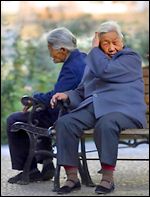|
Love and money reshape family in China
By Robert Marquand (The Christian Science Monitor)
Updated: 2006-01-19 11:10
Love and money
Now, for the first time on a wide scale, Chinese may pursue a spouse of their
own choosing. Only 2 in 10 young Chinese used to choose their life partner;
today, 9 in 10 say they have or will, according to a China Daily report. Along
with this, a discourse of "feeling" and "emotion" that used to exist mainly in
elite circles is now heard at all levels, from tycoons to taxi drivers. Shops
advertise "passion styles" for cars and kitchens. Romance novels are a rage.

SIGNS OF CHANGE:
In Beijing, two older women rest on a park
bench. The family revolution is affecting all ages: As more couples choose
to live away from parents, the elderly are left alone. [The Christian
Science Monitor] | In the past,
couples often did not demonstrate affection inside a strict, loyalty-based
family hierarchy. It was better not to, as Harvard sociologist Martin Whyte
points out, since it might suggest a son's loyalty was not entirely clear.
Couples always lived with the husband's parents, and in times of argument, sons
were expected to side with family elders, not wives. Sons were dependent on
parents. Divorce was discouraged and nearly non-existent. Marriages were
arranged among families or inside "work units;" a main criterion was the
communist or "revolutionary" credentials of the spouse's family.
"My parents were teachers. They found themselves put together by their work
unit," says Qi Mei, a consultant for a paint company in Beijing. "Spouses didn't
use to have an identity, so much as a role. But now marriage is based on
feeling. That will make us a more open society."
"I want to fall in love," says Ms. Xin, a 19-year-old student at a shopping
mall. "I don't want to moan forever about money and jobs. Love is first. Other
things are important but not first."
Yet the dreams of young women like Xin can be tempered by economic realities.
She's part of the first generation who must find their own jobs and earn their
own wages. This creates some anxiety. Apartments are no longer subsidized; jobs
no longer guaranteed. Many parents have no advice for their offspring about a
China evolving at a bewildering rate.
Wealth, it turns out, has caused many urban Chinese to think and behave in
ways that don't always include families. Boarding schools have tripled in the
past decade. Extramarital relations have skyrocketed. As the cost of living
increases in urban China, many young women, often from outside the city, are
subsidized by men.
Typical is Yu Weijing, 25, who stays in Beijing by being enrolled in graduate
school. Her boyfriend is 40, divorced, has a son, and owns a pharmacy. They stay
together five days a month. He pays her rent. She is now dating another
businessman, and wonders if she should change income sources, since she hears
the pharmacist is also dating. She wants a "short cut" to financial security and
a good life, and repeats a saying here that "a good date is better than a good
job." Officials are considering transparency laws requiring husbands to show
family earnings to wives; many divorce cases exist now where wives are suddenly
left only with the furniture.
|